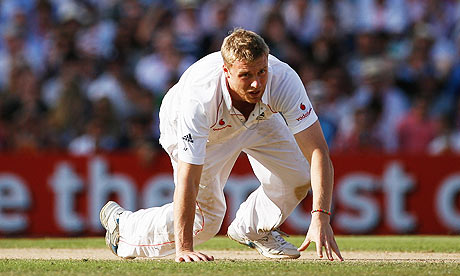Asked, boringly, to explain what his novel Lunar Park was about, Brett Easton Ellis replied briskly, "fathers and sons, all my books are about fathers and sons." He may have been exaggerating, but only slightly because, being inexhaustible, it is a subject to which he often returns. For many it is also a relationship which forms the cornerstone of their love of sport. Certainly, it is for me with cricket.
The first cricketer I remember meeting with my father was Sir Leonard Hutton at Hove. It was Hutton who had made 365 when my father was the same age as I was when I approached him for an autograph. It was Hutton – brave, phlegmatic, dignified – who would become the first professional to captain England.
The last cricketer I remember watching with him was Andrew Flintoff at The Oval. In my memory the young Flintoff strides to the wicket, takes guard and biffs the ball over mid-off and mid-on with such power that the fielder placed at bowler's, rather than wicketkeeper's, long stop can't stop it hitting the hoardings. This might have been the 135 not out described by David Gower as "the most awesome innings we are ever going to see". But, boringly checking the records, my father had been dead for months by then, so I doubt it. Checking the records unearths no evidence of this innings. Trust me, however, it most surely happened. And it is Flintoff – brave, charismatic, amused – who may well be seen as the last amateur to play for England.
Flintoff's career has been one of moments, not records. He has scored nearly 4,000 Test runs and taken more than 200 Test wickets but the figures do not do him justice because it is when you make your runs and take your wickets that is important. Freddie seems to have been at the heart of every significant English victory of this millennium. Apart perhaps, and fittingly if so, this last one. How perfect to take your bow just as your team has finally discovered someone to take your place.
But it is not just the perfect timing which has illuminated Freddie's career but the grace with which he has exhibited it. That moment with Brett Lee, and the gentle sledging of Tino Best ("mind the windows, Tino") just two examples. For Freddie, the game has been the thing. It is all about the game and yet only a game.
He has also magnificently managed to be beyond the brand. Whereas Kevin "KP" Pietersen can appear to be the sum of his slogans, Flintoff has always been his own man. He is too gregarious to be encapsulated in a mere logo. And, liking a drink, he could never be accused of taking things too seriously.
Michael Vaughan, the man who captained Flintoff best, wrote last week, "he is not the most professional cricketer, but with Fred you accept the whole package." And with this most glorious of amateurs this was always more than the facts and figures might represent.
Yesterday, when Freddie walked toward the pavilion, having batted for the last time, the applause was heartfelt. It is a gift great sportsmen bestow that in appreciating their performances we are bonded closer together. And few have delivered it with more aplomb, or a greater sense of fun, than Freddie Flintoff.










